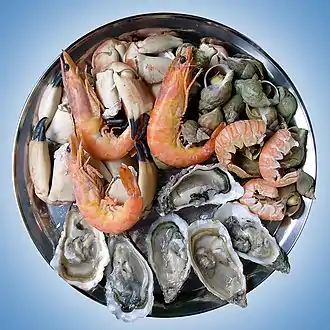.jpg.webp)
Sushi plate (盛り合わせ) with sashimi to the left and a Western-style inside-out roll (rice outside) to the right
There are many sushi and sashimi ingredients, some of which are traditional and others contemporary.
Sushi styles
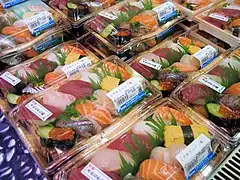
Packaged nigirizushi for sale at a Tokyo supermarket
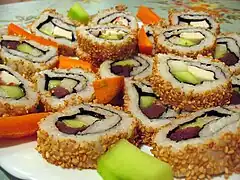
California roll is a contemporary-style maki-zushi.
- Chirashi-zushi (ちらし寿司, scattered sushi) is a bowl of sushi rice topped with a variety of raw fish and vegetables/garnishes (also refers to barazushi)[1][2][3]
- Inari-zushi (稲荷寿司, fried tofu pouch) is a type of sushi served in a seasoned and fried pouch made of tofu and filled with sushi rice.[1][3]
- Maki-zushi (巻き寿司, rolled sushi) consists of rice and other ingredients rolled together with a sheet of nori.[4][2][3]
- Chu maki (中巻き, medium roll) is a medium-sized rolled maki sushi usually containing several ingredients[2]
- Futo maki (太巻き, large or fat roll) is a thick rolled maki sushi containing multiple ingredients[4][1][2][3]
- Gunkan maki (軍艦巻, battleship roll) is a type of sushi consisting of a rice ball wrapped in a sheet of nori which extends in a cylinder upward to hold a loose topping such as fish eggs[1][5][2][3]
- Hoso maki (細巻き, thin roll) is thinly rolled maki sushi with only one ingredient[4][1][2][3]
- Kazari maki (飾り巻き寿司, flower or decorative roll) is a type of sushi designed frequently with colored rice into simple or complex shapes.[4][3]
- Temaki (手巻き, hand roll) is a cone-shaped maki sushi[4][1][2][3]
- Nigiri sushi (握り寿司, hand-formed sushi) consists of an oval-shaped ball of rice topped with a slice of another item[1][2][3][5]
- Oshi sushi (押し寿司, "pressed sushi"), also known as hako-zushi (箱寿司, "box sushi"), is formed by molding the rice and toppings in a rectangular box, then slicing into blocks.[4][1][2][3]
- Uramaki (うらまき, inside-out roll) is a contemporary style of Maki-zushi that is described as a roll that is inside out—with the rice on the outside—and has an outer layer of tobiko or sesame seeds.[4]
Wrappings
Eggs
.jpg.webp)
Tamagoyaki, also referred to as tamago
Meats
Seafood
All seafoods in this list are served raw unless otherwise specified.
Finfish
The list below does not follow biological classification.
- Ainame (アイナメ): fat greenling[3]
- Aji (鯵): Japanese jack mackerel[1][2][3][5]
- Akami (赤身): red meat fish[2]
- Akamutsu (アカムツ): blackthroat seaperch[3]
- Aka-yagara (赤矢柄): red cornetfish[8]
- Amadai (あまだい): tilefish[2]
- Anago (穴子): saltwater eel, Conger eel[4][5][3][2]
- Ankimo (鮟肝): monkfish liver (cooked)[2]
- Ayu (鮎): sweetfish (raw or grilled)[3]
- Buri (鰤): adult yellowtail (cooked or raw)[1][2][3][5]
- Hamachi (魬, はまち): young (35–60 cm) yellowtail[9][3][5]
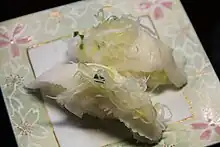
Engawa (meat close to the fin of a flounder) nigirizushi
- Dojo (ドジョウ): Japanese loach[3]
- Ei (エイ): skate[3]
- Engawa (縁側): often referred as 'fluke fin', the chewy part of fluke, a flatfish[3]
- Fugu (河豚): puffer fish[3]
- Funa (フナ): crucian carp[3]
- Gindara (銀鱈): sablefish[3]
- Hamo (鱧, はも): daggertooth pike conger[3]
- Hata (ハタ): grouper[3]
- Hatahata (鰰): sandfish[3]
- Hikari-mono (光り物): blue-backed fish, various kinds of "shiny" (silvery scales) fish[2][3][5]
- Hiramasa (平政, 平柾): yellowtail amberjack (Seriola lalandi)[3]
- Hirame (平目, 鮃): fluke, a type of flounder[4][1][2][3][9]
- Hokke (ホッケ): Okhotsk atka mackerel[3]
- Hoshigarei (干鰈): spotted halibut[10]
- Inada (鰍): very young yellowtail[3]
- Isake (いさけ): trumpeter[1]
- Isaki (伊佐木, いさき): striped pigfish[3]
- Ishigarei (石鰈): stone flounder[11]
- Iwana (イワナ): charr[3]
- Iwashi (鰯): sardine[4][5][3][2]
- Kajiki (梶木, 舵木, 旗魚): swordfish[3]
- Kanpachi (間八): greater amberjack, Seriola dumerili[2][3]
- Karei (鰈): flatfish[3]
- Katsuo (鰹, かつお): skipjack tuna[1][2][3][5]
- Kawahagi (皮剥ぎ): Filefish[2]
- Kibinago (黍魚子): banded blue sprat, or silver-stripe round herring[3]
- Kisu (鱚): sillago[1][2]
- Kochi (こち): flathead[2]
- Kohada (小鰭): Japanese gizzard shad[5][3][2]
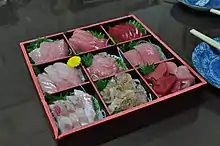
Various cuts of tuna including akami, otoro and chutoro prepared as sashimi
- Kue (クエ): longtooth grouper[3]
- Madai (まだい): red sea bream[2]
- Maguro (鮪): Thunnus (a genus of tuna)[1][9][3][5]
- Chūtoro (中とろ): medium-fat bluefin tuna belly[2][5]
- Kuro (maguro) (くろまぐろ): bluefin tuna, the fish itself[2]
- Kihada (maguro) (木肌鮪, 黄肌鮪, きはだ): yellowfin tuna[2]
- Mebachi (maguro) (めばちまぐろ): bigeye tuna, the most widely distributed fish in Japan[2]
- Meji (maguro) (メジ鮪): young Pacific bluefin tuna[13]
- Ōtoro (大とろ): fattiest portion of bluefin tuna belly[2][5]
- Shiro maguro (白鮪), Binnaga/Bincho (鬢長): albacore or "white" tuna[9][2][3][5]
- Toro (とろ): fatty bluefin tuna belly[9][5]
- Makogarei (まこがれい): marbled flounder[2]
- Mamakari (飯借): sprat[3]
- Matou-dai (まとう-だい): John Dory[1]
- Masu (鱒): Trout[3]
- Mejina (メジナ): Girella[3]
- Nijimasu (虹鱒): Rainbow trout[3]
- Nishin (ニシン): Herring[3]
- Noresore (のれそれ): baby Anago[14]
- Ohyou (大鮃): halibut[5]
- Okoze (虎魚): Okoze stonefish[3]
- Saba (鯖): chub mackerel or blue mackerel Served raw or marinated[1][9][2][5]
- Sake, Shake (鮭): Salmon[1][9][5]
- Sanma (秋刀魚): Pacific saury (autumn) or mackerel pike[2]
- Sawara (鰆): Spanish mackerel
- Sayori (針魚, 鱵): halfbeak (springtime)[1][2]
- Shima-aji (しま鯵): white trevally[1][2]
- Shirauo (しらうお): whitebait (Springtime)[1][2]
- Shiromi (白身) seasonal "white meat" fish[2][5]
- Suzuki (鱸): sea bass[5]
- Seigo (鮬): young (1-2 y.o.) sea bass
- Tachiuo (タチウオ): beltfish[3]

Unagi nigiri sushi
- Tai (鯛): seabream snapper[4][1][9][3][5]
- Madai (真鯛): red sea bream[2]
- Kasugo (春子鯛): young sea bream[2]
- Kurodai (黒鯛): snapper[5]
- Ibodai (疣鯛): Japanese butterfish[3]
- Kinmedai (金目鯛): splendid alfonsino[15]
- Tara (鱈): Cod[3]
- Unagi (鰻): freshwater eel, often broiled (grilled) with a sweet sauce. The preparation of unagi is referred to as kabayaki.[9][3][5]
Inkfish
- Aori ika (あおりいか): Bigfin reef squid[2]
- Hotaru ika (ホタルイカ): Firefly squid[3]
- Ika (烏賊, いか): Cuttlefish or Squid, served raw or cooked[4][1][3][5]
- Sumi ika (墨, すみいか): Japanese spineless cuttlefish[2]
- Tako (蛸, たこ): Octopus[4][9][2][3][5]
- Yari ika (ヤリイカ): Spear squid[2]
Others

Sea cucumber (Namako)
- Hoya (海鞘, ホヤ): Sea pineapple, an Ascidian[3]
- Kamesashi (かめさし): Sea turtle sashimi[7]
- Kurage (水母, 海月): Jellyfish[9]
- Kujira (鯨, くじら, クジラ): Whale[16]
- Namako (海鼠, なまこ): Sea cucumber[3]
- Shiokara (塩辛): Seasoned, salted entrails; frequently squid[4]
- Hitode (ヒトデ): Starfish
- Uni: (雲丹, 海胆) gonad of sea urchin; may come in different colors[17][5][3][2][9]
Roe
.jpeg.webp)
Ikura gunkan maki sushi
Roe is a mass of fish eggs:
- Caviar (キャビア): roe of sturgeon[18]
- Ikura (イクラ): Salmon roe[5][3][9][19]
- Sujiko (筋子): Salmon roe (still in the sac)[19]
- Kazunoko (数の子, 鯑): Herring roe[3]
- Masago (まさご): Smelt roe[9]
- Mentaiko (明太子): Pollock roe seasoned to have a spicy flavor

Shirako (cod sperm) gunkanmaki-zushi
Seaweed
Shellfish
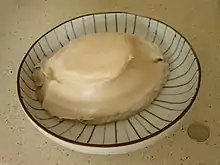
Raw abalone meat
.jpg.webp)
Salmon nigiri
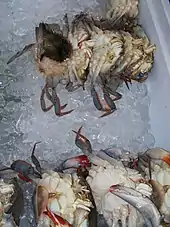
Soft-shell crab on ice
- Akagai (赤貝): Ark shell[4][2][3][5]
- Ama-ebi (甘海老): raw pink shrimp Pandalus borealis[2][3][5]
- Aoyagi (青柳): Trough shell[2][3][5]
- Asari (あさり): Japanese carpet shell[3]
- Awabi (鮑): Abalone[9][2][3][5]
- Botan-ebi (ぼたんえび): Botan shrimp[2][3][5]
- Dungeness crab[22]
- Ebi (海老): boiled or raw shrimp[4][9][5]
- Hamaguri (蛤): Clam, Meretrix lusoria[4][2][3]
- Himejako (ヒメジャコ): Giant clam
- Himo (紐): "fringe" around an Akagai[5]
- Hokkigai, Hokki (ホッキ貝, 北寄貝): Surf clam[9][2][3][5]
- Hotategai, Hotate (帆立貝, 海扇): Scallop[4][9][2][3][5]
- Ise-ebi (伊勢海老): a Spiny lobster, Panulirus japonicus[3]
- Kaibashira (貝柱), Hashira (柱): valve muscles of Scallop or Shellfish[3]
- Kani (蟹): Crab, also refers to imitation crab[4][3][9]
- Kani-miso (カニミソ): Crab offal paste[23]
- Kaki (カキ,牡蠣): Oyster[9][3]
- Kegani (ケガニ): hairy crab[3]
- Kuruma-ebi (車海老): Prawn species Marsupenaeus japonicus[3][2]
- Makigai (マキガイ): Conch[3]
- Mategai (マテ貝): Razor clam
- Matsubagani (松葉蟹): Champagne crab or regionally, Snow crab
- Mirugai (海松貝): Geoduck clam[5][2]
- Sazae (栄螺, さざえ): Horned turban shell
- Shako (蝦蛄): Mantis shrimp or "Squilla"[5][2]
- Shiba ebi (芝海老): Grey prawn
- Shima ebi (しまえび): Morotoge shrimp[2]
- Soft-shell crab[9]
- Tarabagani (鱈場蟹): King crab[3][9]
- Tairagai (タイラギ): Pen-shell clam[2]
- Torigai (鳥貝): Cockle[5][2][9]
- Tsubugai (螺貝, ツブガイ): Whelk (Neptunea, Buccinum, Babylonia japonica)[3]
- Zuwaigani (ズワイガニ/津和井蟹/松葉蟹), also regionally marketed as matsubagani: Snow crab[3]
Vegetables and fruit
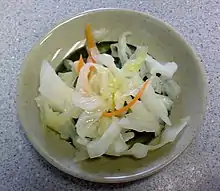
A dish of tsukemono
- Asparagus (アスパラガス)[1][3]
- Avocado (アボカド)[3]
- Carrot (ニンジン): a julienne of carrot[1][3]
- Cucumber (キュウリ): a julienne of cucumber[4][1][5][3]
- Eggplant (ナス): served in small slices, coated with oil[1][3]
- Ginger (しょうが): most often used is pickled ginger: beni shōga and gari[3]
- Gobō (牛蒡): Burdock root[3]
- Kaiware (かいわれ大根): Daikon radish sprouts[3]
- Kanpyō (乾瓢, 干瓢): dried gourd[4][1][5][3]
- Kappamaki (河童巻き): a makizushi made of cucumber and named after the Japanese water spirit who loves cucumber (Kappa)[3]
- Konnyaku (蒟蒻): Cake made from the corm of the Konjac plant[3]
- Nattō (納豆): fermented soybeans[4][1][5][3]
- Negi (ネギ): Japanese bunching onion[5]
- Oshinko (漬物): Takuan (pickled daikon) or other pickled vegetable[3]
- Shiitake (シイタケ): dried shiitake mushrooms, served roasted or simmered[4][1][3]
- Takuan (沢庵漬け): pickled daikon radish[4][3]
- Tofu (豆腐): Soybean curd[3]
- Tsukemono (漬物): various pickled vegetables[3]
- Umeboshi (梅干し): pickled plum[4][3]
- Wasabi (山葵, わさび): paste of wasabi root[3]
- Yam (サツマイモ):[3]
- Yuba (ゆば): Tofu skin[3]
See also
References
- 1 2 3 4 5 6 7 8 9 10 11 12 13 14 15 16 17 18 19 20 21 22 23 24 25 26 27 28 29 30 31 32 33 34 35 Dekura, Hideo; Treloar, Brigid; Yoshii, Ryuichi (2004). The Complete Book of Sushi. Singapore: Lansdowne Publishing/Periplus Editions. ISBN 0-79460-316-5.
- 1 2 3 4 5 6 7 8 9 10 11 12 13 14 15 16 17 18 19 20 21 22 23 24 25 26 27 28 29 30 31 32 33 34 35 36 37 38 39 40 41 42 43 44 45 46 47 48 49 50 51 52 53 54 55 56 57 58 59 60 61 62 Ono, Jiro (November 2013). A Sushi Handbook In English and Japanese (in English and Japanese). Tokyo, Japan: Natsumesha. ISBN 978-4-81-635419-9.
- 1 2 3 4 5 6 7 8 9 10 11 12 13 14 15 16 17 18 19 20 21 22 23 24 25 26 27 28 29 30 31 32 33 34 35 36 37 38 39 40 41 42 43 44 45 46 47 48 49 50 51 52 53 54 55 56 57 58 59 60 61 62 63 64 65 66 67 68 69 70 71 72 73 74 75 76 77 78 79 80 81 82 83 84 85 86 87 88 89 90 91 92 93 94 95 96 97 98 99 100 101 102 103 104 105 106 107 108 109 "Japanese Food Names". oksfood.com Japanese Food Guide. 16 December 2015. Archived from the original on 6 February 2016. Retrieved 12 February 2016.
- 1 2 3 4 5 6 7 8 9 10 11 12 13 14 15 16 17 18 19 20 21 22 23 24 25 26 27 28 Kawasumi, Ken; Driussi, Laura (translated by) (October 2001). The Encyclopedia of Sushi Rolls. Higashi, Sibuya-ku, Tokyo, Japan: Graph-Sha/Japan Publications. ISBN 4-88996-076-7.
- 1 2 3 4 5 6 7 8 9 10 11 12 13 14 15 16 17 18 19 20 21 22 23 24 25 26 27 28 29 30 31 32 33 34 35 36 37 38 39 40 41 42 43 44 45 46 47 48 "Sushi Menu". Sushi Encyclopedia. 2007. Archived from the original on 20 May 2017. Retrieved 12 February 2016.
The sushi menu consists of basic Edo style sushi and they are grouped in their styles.
- ↑ Weil, Y. (2014). "Make My Sushi: Salmon Skin". MakeMySushi.com. Archived from the original on 25 February 2016. Retrieved 17 February 2016.
- 1 2 3 4 5 Insomboon, Panicha (16 January 2015). "7 Kinds of Sashimi Not Made With Fish". ModernFarmer.com. Modern Farmer Media. Archived from the original on 25 October 2021. Retrieved 7 December 2021.
- ↑ Martineau, Robert-Gilles (16 May 2012). "JAPANESE FISH SPECIES 22: CORNET FISH-YAGARA-矢柄". ShizuokaGourmet.com. Archived from the original on 25 February 2016. Retrieved 13 February 2016.
- 1 2 3 4 5 6 7 8 9 10 11 12 13 14 15 16 17 18 19 20 21 22 23 24 Fraioli, James O.; Sato, Chef Kaz (2008). The Complete Idiot's Guide to Sushi and Sashimi. New York, NY: Alpha Books. ISBN 978-1-59257-782-8. Archived from the original on 2016-11-30. Retrieved 2016-02-19.
- ↑ "Sushi – Japanese Food Recipes". sushi-ABC.com. 2003. Archived from the original on 2 March 2016. Retrieved 13 February 2016.
- ↑ "JAPANESE SEASONAL FISH: ISHIGAREI/STONE FLOUNDER". ShizuokaGourmet.com. 31 January 2010. Archived from the original on 4 February 2016. Retrieved 13 February 2016.
- ↑ Martineau, Robert-Gilles (7 May 2007). "TUNA SPECIES 6: MEKAJIKI/MARLIN". ShizuokaGourmet.com. Archived from the original on 25 February 2016. Retrieved 15 February 2016.
- ↑ "Bluefin tuna". kodanmalcorp.com. 2014. Archived from the original on 25 February 2016. Retrieved 15 February 2016.
- ↑ Martineau, Robert-Gilles (28 February 2007). "NORESORE/CONGER EEL WHITEBAIT". Shizuoka Sushi and Sashimi. The Twenty Fourteen Theme. Blog at WordPress.com. Archived from the original on 25 February 2016. Retrieved 18 February 2016.
- ↑ "Kinmedai Golden Eye Snapper". Sushi311.org. 2016. Archived from the original on 1 March 2016. Retrieved 18 February 2016.
- ↑ Palmer, Brian (11 March 2010). "What Does Whale Taste Like?". Slate Magazine. Archived from the original on 7 September 2011. Retrieved 18 February 2016.
- ↑ "Sushi Items - Uni (Sea Urchin)". The Sushi FAQ. Archived from the original on 22 July 2012. Retrieved 18 December 2014.
- ↑ "一貫一万円の寿司". デイリーポータルZ. September 21, 2015. Archived from the original on August 17, 2022. Retrieved June 10, 2023.
- 1 2 Lowry, Dave (5 October 2005). The Connoisseur's Guide to Sushi: Everything You Need to Know About Sushi Varieties and Accompaniments, Etiquette and Dining Tips and More. Harvard Common Press. pp. 143-144. ISBN 1-5583-2307-4.
- ↑ Hui, Yiu H. (2006). "Caviar and Fish Roe". Handbook of Food Science, Technology, and Engineering. CRC Press. pp. 161–12. ISBN 0-8493-9849-5. Archived from the original on 2022-03-19. Retrieved 2020-12-12.
- ↑ "Learn more about Kombu Seaweed Products". kurakonusa.com. KURAKON Foods, Inc. Archived from the original on 1 March 2016. Retrieved 18 February 2016.
- ↑ Johnson, Diana (27 October 2009). "Dungeness Crab, Avocado, and Cucumber Sushi in Soy Wrappers". EatingRichly.com. Eating Richly. Archived from the original on 14 February 2016. Retrieved 18 February 2016.
- ↑ "Winter Crab: Kani Miso, Kani Nabe, Kani Zosui". KyotoFoodie.com. Kyoto Foodie. 24 January 2009. Archived from the original on 9 February 2016. Retrieved 18 February 2016.
External links
 Media related to Sushi at Wikimedia Commons
Media related to Sushi at Wikimedia Commons Media related to Sashimi at Wikimedia Commons
Media related to Sashimi at Wikimedia Commons List of sushi and sashimi ingredients at the Wikibooks Cookbook subproject
List of sushi and sashimi ingredients at the Wikibooks Cookbook subproject- Secrets of Sushi - Sushi Sauce
This article is issued from Wikipedia. The text is licensed under Creative Commons - Attribution - Sharealike. Additional terms may apply for the media files.
